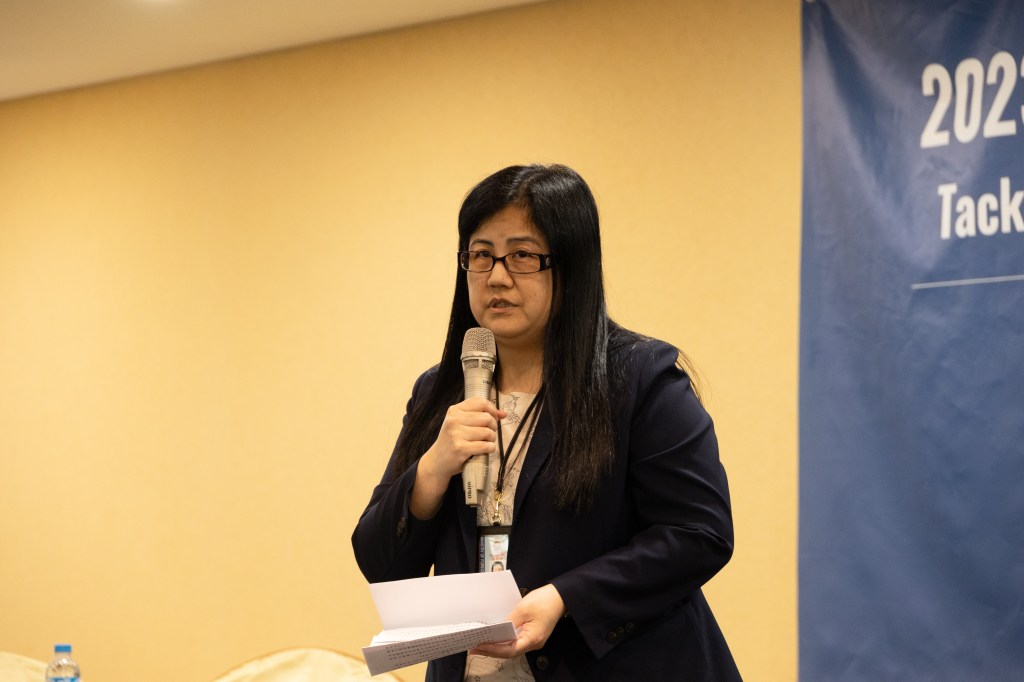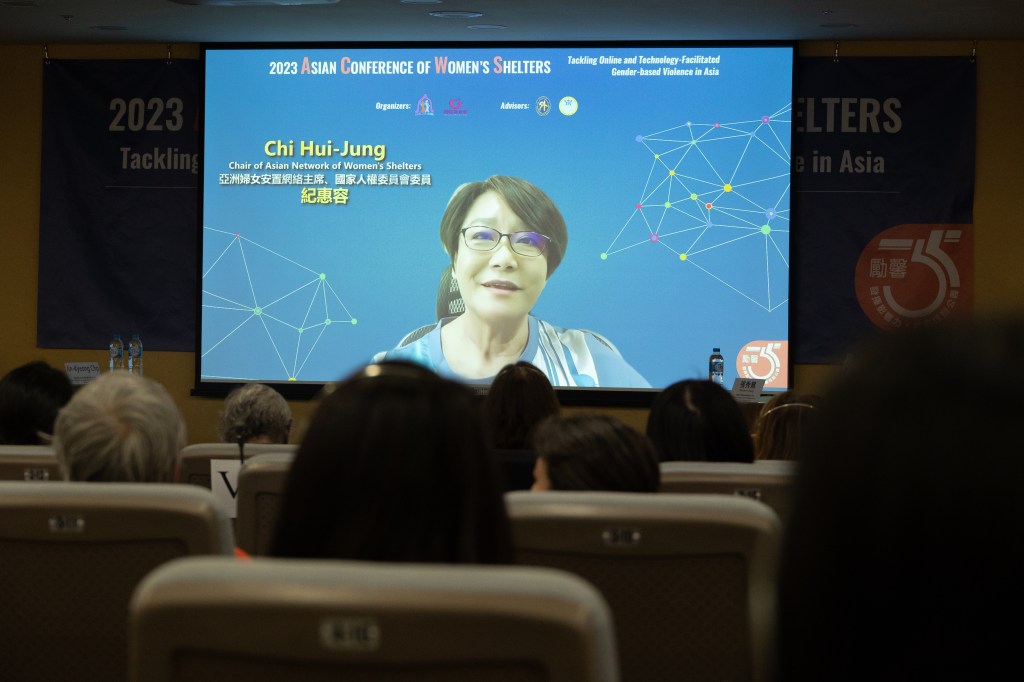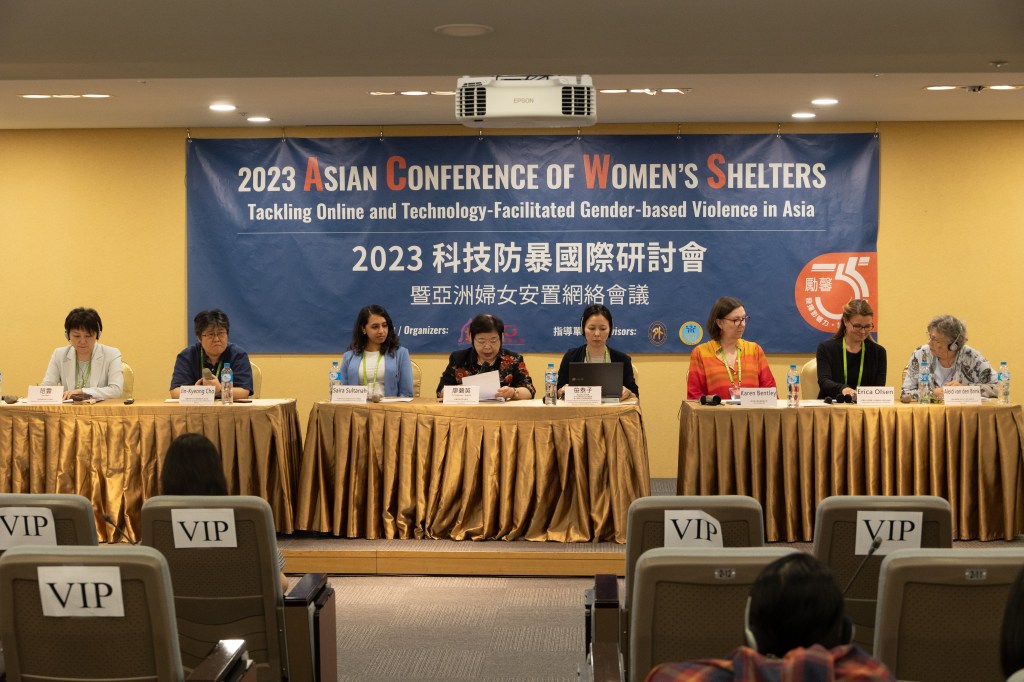
To delve into the emerging forms of gender-based violence on a global scale, the Garden of Hope Foundation and the Asian Network of Women’s Shelters (ANWS) jointly hosted the “2023 Asian Conference of Women’s Shelters: Tackling Online and Technology-Facilitated Gender-Based Violence” in Taiwan from September 12 to 13, 2023.
The event was inaugurated by Garden of Hope Foundation CEO Wang Yueh-hao, Deputy Minister of the Ministry of Health and Welfare, Lee Li-Feng, Deputy Director-General Department of NGO International Affairs, Ministry of Foreign Affairs, Elvie Wu, First Vice Chair of GREVIO, Council of Europe Aleid Van Den Brink, and Chairperson of ANWS and National Human Rights Commission member Chi Hui-Jung.

Garden of Hope Foundation CEO Wang Yueh-hao stated in her speech: “Garden of Hope recognized the increasing diversity and severity of technology-facilitated gender-based violence. This not only placed immense physical and psychological pressure on victims but also threatened their personal safety and privacy. Due to the extensive scope of technology-facilitated gender-based violence, collaborative efforts were needed to enhance prevention, education, and support for survivors. This conference also responded to the United Nations’ call to strengthen cooperation between governments, the technology industry, civil society, and women’s rights organizations to effectively address global technology-facilitated gender-based violence.”

Deputy Minister of the Ministry of Health and Welfare Lee Li-Feng expressed in her speech: “Today, we had guests from 17 countries. Garden of Hope had devoted great effort to organizing this event, which was of significant importance to both the international community and Taiwan. There have been many related legal amendments recently, such as the enactment of the Stalking and Harassment Prevention Act last year and the passage of four digital sexual violence prevention laws in February of this year. Services for victims of sexual imagery offenses had been established, and explicit content involving minors could now be taken down within 24 hours. Last month, amendments regarding sexual harassment issues were also passed, including strengthening services and complaint mechanisms for victims of sexual harassment. Regarding the violence that technology brings to women, the Ministry of Health and Welfare hoped to provide protection for victims in terms of prevention and crime fighting. We looked forward to this conference bringing about a better future.”

MOFA Department of NGO International Affairs Deputy Director Elvie Wu stated: “On behalf of the Ministry of Foreign Affairs, I thanked Garden of Hope for organizing this event. In 2023, the Ministry of Foreign Affairs collaborated with Garden of Hope to advocate for a friendly environment for women, children, and gender rights globally. Technology has its pros and cons. The advantage was that conferences like this could transcend geographical constraints, allowing global partners to exchange ideas. The downside was exemplified by past incidents like the Nth Room case in South Korea and the recent #MeToo movement. To prevent perpetrators from reoffending, NGOs led the discussion on these issues ahead of the government. We also needed to reference these experiences to achieve proactive prevention and to support victims of incidents that had already occurred. I hoped that over these two days, countries could exchange their experiences, take this information back to their own countries, and contribute their efforts to global technological anti-violence.”

First Vice Chair of GREVIO, Council of Europe Aleid Van Den Brink stated: “This was my second time attending the World / Asian Conference of Women’s Shelter. In 2019, it was held in Kaohsiung, and it forged a strong friendship. At this conference, I would also share our global experience in technology-facilitated violence. When we talked about online and offline technology violence, it required policy support, including prevention and related regulations. I hoped to learn from Asia’s prevention methods through this exchange.”

Chair of ANWS and Commissioner of the National Human Rights Commission of the Control Yuan, Chi Hui-Jung stated: “ANWS provided a global platform to effectively prevent technological violence. We live in the age of technology. According to a study by The Economist, 85% of women witnessed online violence. Since its establishment, ANWS has continued to collaborate with relevant organizations in Asia to ensure that the most vulnerable groups are protected. This two-day conference allowed our efforts to prevent the latest online violence. I wish the conference a great success.”

During the event, United Nations experts, government representatives from various Asian countries, leaders of women’s service and advocacy groups, as well as leaders and experts from the global technology industry gathered to focus on the discussion of digital technology-facilitated gender-based violence issues. There were over 350 participants from more than 62 countries who had registered to participate, indicating the high level of international attention to this issue. Speakers addressed the harm caused by digital gender-based violence in Asian countries through various approaches, including technology, legislation, and civil society advocacy and services.
Challenges in the Digital Age: Advocating for Asian Society’s Attention to Digital Technology-Facilitated Gender-Based Violence
With the rise of digital information, the virtual world had brought us endless possibilities, but it had also led to an increasingly serious problem: technology-facilitated gender-based violence. While technology-facilitated gender-based violence was not a new issue, it had rapidly escalated under the prevalence of COVID-19. Despite efforts by global gender violence service providers and experts to address the issue, there were significant disparities in the development process among different countries. Many Asian countries have yet to incorporate this new form of gender-based violence into their mechanisms for gender violence service and prevention. With the rapid development of technology and the online world, new forms of technology-facilitated gender-based violence continued to emerge and evolve, despite the existence of over 40 different types.
This conference aimed to call on global society to explore how gender-based violence evolved and spread in the rapidly changing digital technology landscape, affecting various social groups. It focused on seeking solutions to technology-facilitated gender-based violence and providing sufficient support to victims. To ensure that different roles in the gender violence service chain in Asia understand the current status and severity of this issue, and to enhance services centered around survivors, advocate for immediate services and preventive legal policies, and strengthen cooperation between governments, technology companies, relevant civil society groups, and women’s organizations in Asian countries, the conference design provided a diverse platform for experts in various fields of this issue to engage in dialogue, share practical knowledge for eliminating technology-facilitated gender-based violence. In addition to national reports from various countries, specific issues related to technology-facilitated gender-based violence such as online dating safety, the dissemination of sexual imagery involving minors, emerging trends in digital violence, and innovative services in various Asian countries were included. The conference also covered measures for prevention and control by technology and social media platform operators, as well as government legislation.

Bringing together 17 country experts to jointly address global technology-facilitated Gender-Based Violence Issues
In order to ensure that diverse voices were included in this conference, a total of leaders and experts from Europe, the United States, Australia, and various Asian countries were invited to participate. The conference kicked off with a video presentation by Sarah Baird, Gender-Based Violence Specialist at the Asia and Pacific Regional Office of the United Nations Population Fund, offering a UN perspective to initiate the conference dialogue.
Keynote Speaker Sarah Baird stated in her speech: “While anyone could potentially experience violence online, the majority of victims of technology-facilitated gender-based violence were still women. What was worse was that harassment of women starting from the online realm often extended to their real-life experiences. A study in Malawi found that over one-third of women believed that the violence they experienced online eventually led to physical harm. Although some countries had improved laws regarding online safety, these laws were often ‘gender-blind,’ ignoring the specific dangers women faced online. Therefore, legislation should consider gender, especially in light of the harm women face from technology-facilitated gender-based violence.

Additionally, research on how to effectively respond to and mitigate technology-facilitated gender-based violence was still scarce, and many service solutions were still in their initial stages. From a global perspective, solutions for technology-facilitated gender-based violence had to create a ‘viable business model.’ Algorithms themselves had no moral standards; the purpose of their existence was to increase revenue. This model encouraged young men to access more toxic content online, linking them with perpetrators of violence from around the world. To understand this issue, more research was needed, and the United Nations Population Fund was conducting many research projects and advocacy activities.”
Cooperation and Collective Efforts: Involvement of the Technology Industry and Policy Discussions
Addressing emerging issues of technology-facilitated gender-based violence required cross-sectoral collaboration, so this conference also included sessions with technology companies and policy discussions. Prominent technology companies like Meta participated in the conference to share their measures and strategies for addressing gender-based violence on their platforms. In the policy and legal sessions, representatives from Australia, the first country to pass a digital safety law, shared the features of their law and the challenges in its implementation. Ms. Fan Yun, a legislator in Taiwan, also attended and shared Taiwan’s legislative process and achievements in addressing digital gender-based violence, providing valuable insights for both international and local industries and policymakers.
